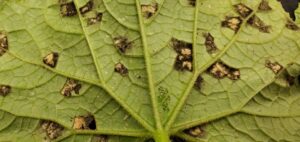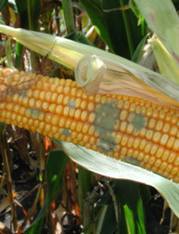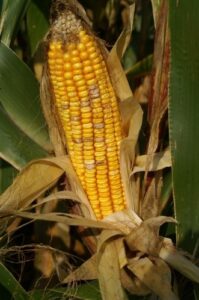Hairy galinsoga spreads throughout a farm by seeds that germinate quickly once exposed to light, with multiple generations in a growing season. Using knowledge about the life cycle of this weed is important when making management decisions that require time and effort throughout a growing season. Learn more about non-herbicide management methods to control hairy galinsoga populations on your farm by using the hairy galinsoga decision tool fact sheet and a companion presentation. These resources are one of a five-part weed management series created by Extension Specialist Thierry Besancon and County Agricultural Agent Meredith Melendez, funded by USDA Specialty Crop Block Grant AM190100. You can provide feedback through an online survey about these resources.
Vegetable Crops Edition
Seasonal updates and alerts on insects, diseases, and weeds impacting vegetable crops. New Jersey Commercial Vegetable Production Recommendations updates between annual publication issues are included.
Subscriptions are available via EMAIL and RSS.
Quick Links:
 NJ Commercial Vegetable Production Recommendations
NJ Commercial Vegetable Production Recommendations
 Rutgers Weather Forecasting - Meteorological Information important to commercial agriculture.
Rutgers Weather Forecasting - Meteorological Information important to commercial agriculture.
Hairy Galinsoga: Non-Herbicide Management Options in Specialty Crops
Cucurbit Downy Mildew Alert – 9/16/22 – Pumpkin and Butternut Squash
Cucurbit downy mildew has been confirmed on pumpkin and butternut squash in New Jersey. Cucurbit downy mildew was confirmed on summer squash in southern New Jersey a few weeks ago and cucumber earlier this season. Remember, some CDM isolates fall into Clade I which predominately infect watermelon, pumpkin, and squash, where other CDM isolates in Clade II predominately infect cucumber and cantaloupe. All cucurbit growers should scout on a regular basis and initiate a weekly CDM fungicide program.
For more information on CDM, the clades, and CDM control please click here.

Cucurbit downy mildew sporulating on the underside of an infected cucumber leaf.
Vegetable IPM Update 09/14/22
Note: Insect trap data are unavailable from much of southern New Jersey this past week due to staff shortages. No maps will appear in this edition. Maps will resume later in September as conditions permit. Interpretations from available data will continue in the absence of maps.
Sweet Corn
European corn borer (ECB) moth catches are nearly non-existent now. At this time, no feeding has been detected.
Hessian Fly-Free Planting Date Reminder
Grower planting small grains for ‘grain’ harvest next year should review the Hessian fly-free planting date for their area. Wheat is more at risk, rye for grain is least at risk.
Additional information on this season’s damage in wheat in Salem County can be found at: https://plant-pest-advisory.rutgers.edu/crop-progress-and-hessian-fly-sightings/
Penn State article on early planting and risk of hessian fly damage
Penn State Fact Sheet on Hessian Fly
Beck’s Hybrids has a map on their website that is also helpful to gauge your location
High Probability of Downed Droughty Corn During Hurricane Season
The national oceanic and atmospheric agency at Colorado University has released their forecasting for the next two months of the Hurricane and Tropical Storm Season. The strong La Nina is persisting into a third year coupled with decreasing water temperatures returning closer to normal for this time of year are reportedly similar to 1999, 2000, 2011 and 2021 conditions.
Field corn: The stalk stability of droughty corn is much less tolerant to high winds than non-droughty corn. Given the drought conditions, corn producers may have the ability to harvest corn earlier than normal due to rapid dry down on the cob. Current soil moisture conditions are very suitable for fitting fields for winter small grain establishment.
 Aspergillus mold species often show up after drought conditions, posing a significant risk of aflatoxins in the corn crop if present. Aspergillus molds are carcinogenic to people and cause losses in livestock and poultry. Combine operators and elevator operators should take precautions against inhaling fungal spores. Signs of Aspergillus ear rot include evidence of powdery olive-green mold on the ear tip or on kernels in the ear.
Aspergillus mold species often show up after drought conditions, posing a significant risk of aflatoxins in the corn crop if present. Aspergillus molds are carcinogenic to people and cause losses in livestock and poultry. Combine operators and elevator operators should take precautions against inhaling fungal spores. Signs of Aspergillus ear rot include evidence of powdery olive-green mold on the ear tip or on kernels in the ear.

Fusarium ear rots are also probable in fields that had significant high humidity and high temperatures as grains are developing to black layer. Fusarium molds show up as white to pink cotton-like growths mold scattered throughout the ear. A starburst like pattern may occur on infected kernels that may also be brown in color.
*Inhaling poison ivy volitile oils and ivyleaf morning glory and jimson weed dust as they go through the combine along field edges should also be avoided.
For additional images see https://cropprotectionnetwork.org/encyclopedia/aspergillus-ear-rot-of-corn
Hurricane Season: Hurricane forecasters have stated that this La Nina and nearer to average water temperatures are similar to 1999, 2000, 2011 and last year. Given that in 1999, 11.41 inches of rain fell in Salem County; and in 2000, 5.76 inches fell in Salem County; and in 2011, 6.19 inches fell in Salem County in the month of September, producers who can harvest early may want to consider higher moisture harvest if standability is an issue. Hurricane season peaks from mid-August to mid-October with the season ending on Nov. 30.
Soybeans: Soybean fields should be walked for signs of stem snap in areas with high levels of soybean stem borer activity in 2020 and where July herbicide applications visibly stressed plants during the height of the drought this season. Due to in season stresses, bean maturity in the pods may be farther along in some fields than leaves indicate. If 90% of the beans are tan, test moisture levels frequently.
Salem County producers can pick up mycotoxin plant analysis bags at the extension office. Current pricing from regional laboratories are as follows:
1. NJ Department of Agriculture website submission form: (click link)
| Mycotoxin test. Please call the laboratory to check on current availability and pricing |
2. Dairy One Mycotoxin Testing: (click link)
- Mycotoxin Panel $105: Aflatoxin B1, B2, G1, G2, Vomitoxin, Zearalenone, T2, 3-acetyl DON, 15-acetyl DON
- Ochratoxin A $77
- Fumonisin B1, B2, B3 $77
- Full Panel $210
3. Dairyland Laboratories Individual Toxins: (click link)
- Aflatoxin $55.00
- Vomitoxin (DON) $55.00
- Zearalenone $55.00
- T-2 /HT2 $55.00
- Fumonisin $55.00
- Ochratoxin $55.00
Check out the historical storm map maker image below at https://spacecoastdaily.com/2019/08/noaa-historical-hurricane-tracks-explore-more-than-150-years-of-historical-hurricane-landfalls/

Vegetable IPM Update 09/07/22
Sweet Corn
European corn borer (ECB) moth catches have declined, and are at very low levels throughout the state. At this time, no feeding has been detected.
The highest nightly trap catches of ECB for the week ending 09/07/22 are as follows:
| Allentown 2 | Lawrenceville 1 |
| New Egypt 2 | Pennington 1 |
| Crosswicks 1 | |
| Georgetown 1 |
